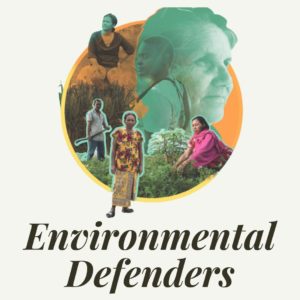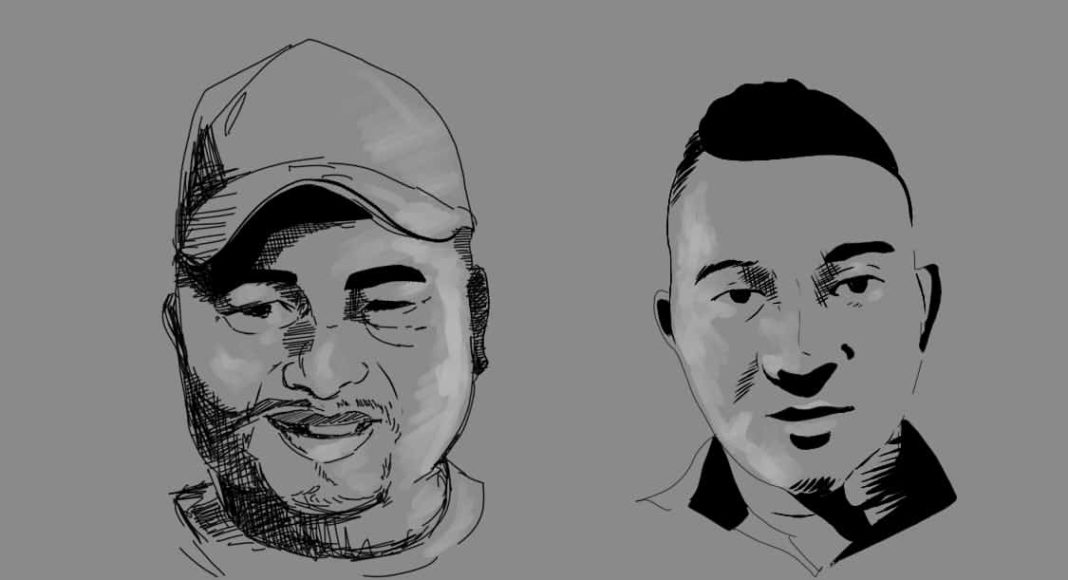This article, originally published by our partner Expediente Público here, has been translated by Leon Elliott as part of our Environmental Defenders series highlighting the achievements and dangers of those defending their rights to land, water, and their way of life in the region.
‘The Government is responsible for these two murders, and Xiomara Castro must provide an explanation,’ declared ERIC-SJ researcher Joaquín Mejía Rivera, in the wake of the killing of two environmental defenders in Guapinol.
Congresswoman Suyapa Figueroa has called for the immediate ratification of the Escazú Agreement to protect the rights of environmental defenders.
What interests does the new Honduran government have in the Los Pinares mining project?
This is the question being asked following the killing of two environmental defenders from the community of Guapinol, located in the municipality of Tocoa, in Colón, eastern Honduras, last month.
The murders took place one day into a 45-day state of emergency imposed on Tocoa as well as neighbouring municipalities Trujillo, Sonaguera, and Bonito Oriental.
The event has since triggered both national and international response, and dealt a reputational blow to the government of President Xiomara Castro, as she approaches her first year in power. Castro has been criticised for her failure to take any convincing action to resolve the ongoing conflict between environmental defenders from the Guapinol community and powerful political and economic actors in the region.
On the afternoon of Saturday 7 January, environmentalists Aly Domínguez (34) and Jairo Bonilla (28) were riding home on a motorbike when they were fatally shot at an intersection of the CA-13 highway leading to Guapinol and La Concepción.
The Municipal Committee for the Defense of Common and Public Goods in Tocoa described Domínguez, the brother of fellow environmental defender Reynaldo Domínguez, as ‘one of the 32 people criminalised by the Inversiones Los Pinares mining company and the State of Honduras, for defending the Carlos Escaleras National Park against illegal mining.’
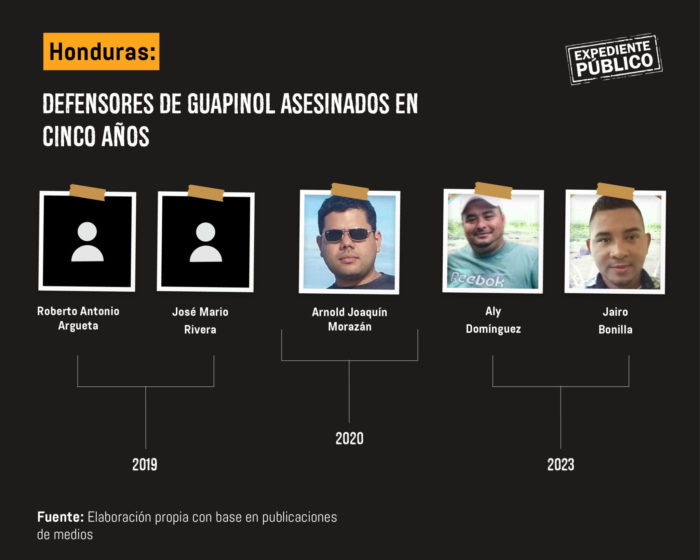
Silence from authorities
Speaking about the incident late on the afternoon of Monday 9 January, a spokesperson for the National Police in Tocoa confirmed that they were yet to open an investigation into the crime.
According to the police, the victims had been travelling to collect service fees from a cable company when the crime occurred. ’As of now, the National Police are considering robbery to be the motive as none of the deceased’s clothes were found at the scene,’ the spokesperson added.
However, some have disagreed with the police’s initial stance. ‘When it comes to people who have been criminalized, and who are part of a community known for defending their rivers, there must be a presumption that any act against them, in this case murder, is related to the defence of their territories, community, and rivers, and any subsequent investigations should follow that lead’, claimed Joaquín Mejía Rivera, a researcher at ERIC-SJ, in an interview with Expediente Público.
At the time of publication, no representative of the Castro administration had commented on the crime, with the Human Rights Secretariat being the only central government agency to condemn the events publicly.
When it comes to people who have been criminalized, and who are part of a community known for defending their rivers, there must be a presumption that any act against them, in this case murder, is related to the defence of their territories, community, and rivers, and any subsequent investigations should follow that lead.
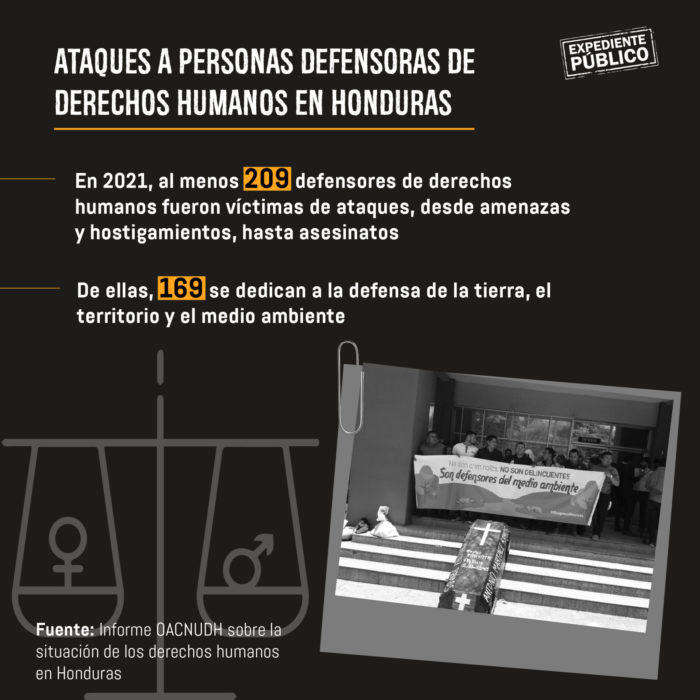
The origin of the conflict
Activists from Guapinol have condemned the Inversiones Los Pinares mining project for its unlawful and irregular activities.
The reported irregularities date back to 2014, when Inversiones Los Pinares was granted an exploitation concession for mining despite not possessing the required environmental permits.
Mejía Rivera also described how the company ‘produced a list from a supposed open assembly, which was falsified, at which they alleged that local communities had given approval’, in order to gain permission for their mining activities.
He added that Liberty and Refoundation (Libre) politician Adán Fúnez, who was at the time the Mayor of Tocoa and now serves as Governor of the department of Colón in the current Castro government, participated in these irregularities ‘in collusion with the Los Pinares company’.
The Public Prosecutor’s Office, the Attorney General’s Office, and the Honduran Institute of Geology and Mines (IHGEOMIN) have acknowledged the irregularities involved in the approval of the project. Meanwhile, the University of Virginia School of Law published a 2020 report recognising the unlawful and irregular activities that lead to the licensing of the Los Pinares project.
Mining on the river Guapinol
Honduran mining law states that a project must be suspended if it puts the life and health of the local population at risk. According to Mejía Rivera, there is sufficient evidence to suspend the ongoing project on these grounds, regardless of the fact that the original mining licence had been granted illegally.
Local communities first spotted a change in the colour of the river Guapinol around a year after the concession was granted. This led to protests, which were ultimately ignored by the previous government, led by Juan Orlando Hernández (2014-2022).
The project is also having a severe impact on the river San Pedro. The San Pedro provides water to more than 14 communities and is located within the Carlos Escaleras National Park, which according to Mejía Rivera is ‘being destroyed’ by mining activity.
The Carlos Escaleras National Park, previously known as the Montaña de Botaderos National Park, was renamed after an environmental activist from Tocoa who was assassinated in 1997, as part of a ruling by the Inter-American Court of Human Rights (IACHR).
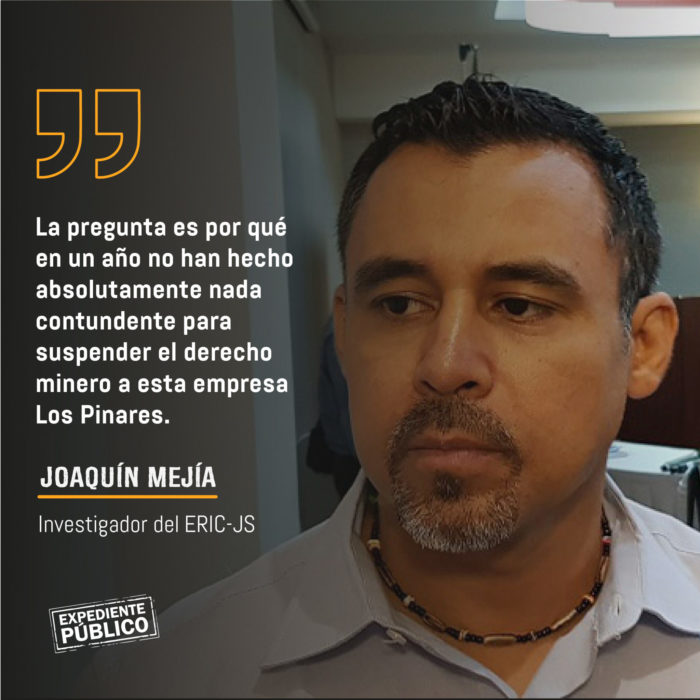
The Escazú Agreement is yet to be ratified
Suyapa Figueroa is a congresswoman for the Savior Party of Honduras (PSH) and sits on the Environment and Climate Change Commission within the National Congress.
‘Any violence that occurs is the responsibility of the State. The State should protect those defending human rights’, declared Figueroa in an interview with Expediente Público.
;As land defenders, they are defending the commons, the right to water, and the right to exist, of people living in areas where mining is generating serious problems and putting the lives of the local population at risk’, she added.
Figueroa cited the importance of the Escazú Agreement. This piece of legislation aims to promote and defend the rights of environmental defenders, but is yet to be ratified by the National Congress.
Figueroa argued that the Escazú Agreement ‘must be ratified without delay, to provide effective support and protection to those who defend the environment.’
‘It is our obligation to ratify these agreements which will protect land and environmental defenders’, she reiterated.
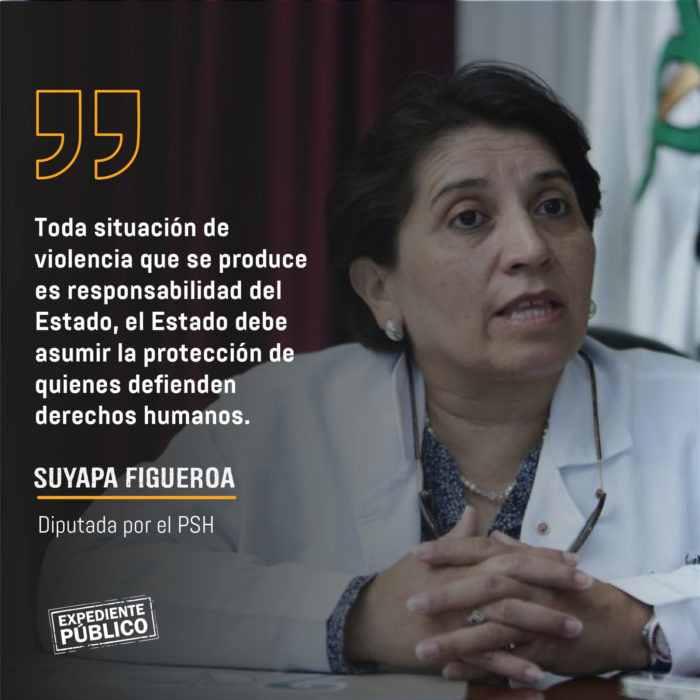
Lack of political action
Mejía Rivera has a suspicion as to why authorities are yet to act in accordance with Honduran mining law and suspend the ongoing project.
’The current authorities, like those of the previous administration, have neither the political will nor courage to withdraw or suspend the mining rights of powerful companies such as those belonging to the Pérez-Facussé family,” he claimed.
Lenir Pérez and Ana Facussé, the son-in-law and daughter of Miguel Facussé, inherited significant economic, political, and symbolic power when the powerful landowner passed away in 2015.
What are the interests of the mining company?
Mejía Rivera believes that the violence against environmental defenders in Guapinol will continue until the issue surrounding the granting of the mining concession is resolved.
‘One wonders where the interests of the new authorities lie in terms of this mining project, and what is preventing mining law from being applied. I believe that the Government is responsible for these two murders, and Xiomara Castro must provide an explanation’, he added.
‘It is understandable, for example, that under the previous regime, authorities were content not to take any action, because they were acting as part of a narco-state. However, now we are talking about a supposedly progressive government, a government of the people,’ he continued.
Since the crime, authorities have visited the area, issued a statement of solidarity with the families, and denounced the “‘terrible’ role of the Public Prosecutor’s Office in criminalizing Guapinol defenders.
Nonetheless, Mejía Rivera maintains that these acts alone are inadequate unless accompanied by the suspension of the mining licence, as is within the powers of the authorities.
‘As of now, we do not understand why these mining rights have not been revoked, despite the damage caused to the environment, and the danger caused to the life and safety of the population,’ he concluded.
Our Environmental Defenders series highlights the achievements and dangers of those defending their rights to land, water, and their way of life in the region.
